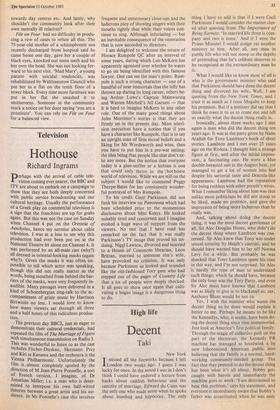Television
Hothouse
Richard Ingrams
perhaps with the arrival of cable tele- vision coming ever nearer, the BBC and ITV are about to embark on a campaign to show that they are both deeply concerned With public service broadcasting and our cultural heritage. Usually the performance of a Greek play on commercial television is a sign that the franchises are up for grabs again. But this was not the case on Sunday when Channel 4 put on the Oresteia of Aeschylus, hence my surmise about cable television. I was at a loss to see why this production had ever been put on at the National Theatre let alone on Channel 4. It was performed by an all-male cast (why?) all dressed in oriental-looking masks (again Why?). Given the masks it was often im- possible to tell which actor was speaking, though this did not really matter as the words, being mouthed from behind the bar- riers of the masks, were very frequently in- audible. Many passages were delivered in a kind of Schoenbergian sing-talk to the ac- companiment of grisly music by Harrison Birtwistle no less. I would love to know how many viewers sat through all three and a half hours of this ridiculous produc- tion.
The previous day 13BC2, just as eager to demonstrate their cultural credentials, had repeated the film of The Marriage of Figaro With simultaneous transmission on Radio 3. This was wonderful to listen to as the cast includes Fischer-Dieskau, Hermann Prey and Kin te Kanawa and the orchestra is the Vienna Philharmonic. Unfortunately the film is almost completely spoiled by the direction of M Jean-Pierre Ponnelle, a sort of French version, I imagine, of Dr Jonathan Miller; i.e. a man who is deter- mined to interpose his own half-witted theories between a great artist and his au- dience. In Mr Ponnelle's case this involves
frequent and unnecessary close-ups and the ludicrous ploy of showing singers with their mouths tightly shut while their voices con- tinue to sing. Although infuriating — but an inevitable consequence of the veneration that is now accorded to directors.
I am delighted to welcome the return of Horace Rumpole QC after an interval of some years, during which Leo McKern has apparently agonised over whether he wants to go on being identified with this famous lawyer. One can see the man's point. Rum- pole is such a strong character — one of a handful of near immortals that the telly has thrown up during its long career, others be- ing Arthur Lowe's Captain Mainwaring and Warren Mitchell's Alf Garnett — that it is hard to imagine McKern in any other role. One of the many good things about John Mortimer's stories is that they are firmly set in the present day. Most televi- sion executives have a notion that if you have a character like Rumpole, that is to say an upright man of firm moral beliefs and a liking for Mr Wordsworth and wine, then you have to put him in a pre-war setting; the idea being that people like that don't ex- ist any more. But the notion that everyone today is a glue-sniffer or a lesbian is one that could only thrive in the \ hot house world of television. While we are still on the subject I would like to commend Peggy Thorpe-Bates for her consistently wonder- ful portrayal of Mrs Rumpole.
To his credit Cecil Parkinson did not funk his interview on Panorama which had been scheduled prior to the momentous disclosures about Miss Keays. He looked suitably tired and concerned and I imagine evoked a huge wave of support from the viewers. No one that I have read has remarked on the fact that it was really Parkinson's TV image that proved his un- doing. Nig9I Lawson, divorced and married to a' House of Commons librarian, Leon Brittan, married to someone else's wife, have provoked no criticism. It was only because Parkinson so looked and sounded like the old-fashioned Tory gent who had stepped out of the pages of Country Life that a lot of people were deeply shocked. It all goes to show once again that culti- vating a bogus image is a dangerous thing to do.










































 Previous page
Previous page